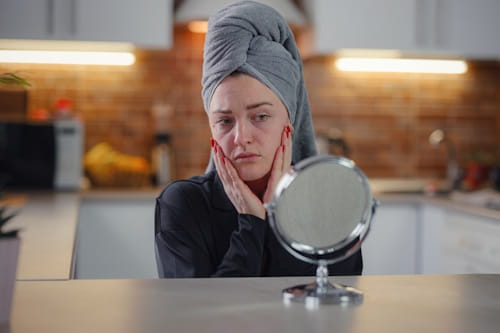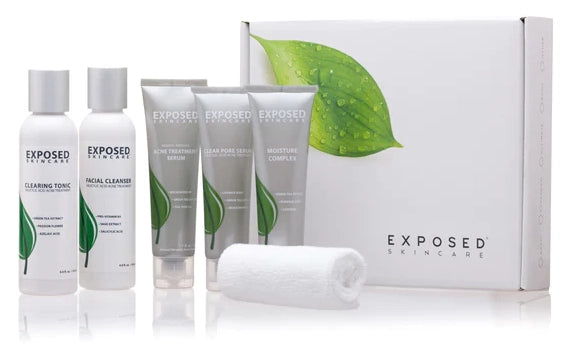Tea tree oil, derived from the Australian tea tree, is a popular essential oil known for its benefits, particularly in treating various skin conditions. One of the most common uses of tea tree oil is for acne treatment. However, using pure tea tree oil on your face might lead to skin irritation.
This is why it is essential to know how to dilute tea tree oil for acne. This article will guide you through the process, ensuring you reap the benefits of tea tree oil without any adverse effects.
Also read: How to choose the best acne treatment
Biggest Take-Aways:
- Diluting tea tree oil is crucial to avoid skin irritation and harness its full acne-fighting potential.
- When used correctly, tea tree oil can treat mild to moderate acne and reduce acne scarring.
- Various carrier oils, like coconut oil, can be used with tea tree oil for safe application.
- Exposed Skin Care products effectively integrate tea tree oil, offering a holistic approach to acne management.

Why Dilute Tea Tree Oil?
Before diving into how to dilute tea tree oil for acne, it's essential to understand why dilution is crucial. Tea tree essential oil is potent and can lead to skin sensitivity or irritation if applied directly.
Benefits of Tea Tree Oil for Skin
- Anti-inflammatory properties: Tea tree oil has both anti-inflammatory and antibacterial properties, making it effective against acne.
- Acne spot treatment: It can be used as an acne spot treatment to target specific acne spots and reduce inflammation.
- Reduction of acne scarring: With regular use, it can also help reduce acne scarring, giving your skin a smoother texture.
Risks of Using Undiluted Tea Tree Oil
- Skin Irritation: Applying undiluted tea tree oil on your face or any part of your body can irritate the skin, leading to redness and burning sensations.
- Skin Sensitivity: Pure tea tree oil can also make your skin more sensitive, especially when exposed to sunlight.

Steps to Dilute Tea Tree Oil for Acne
Understanding how to dilute tea tree oil for acne is simple yet crucial. Here's a step-by-step guide to ensure you do it right.
1. Choose a Carrier Oil
Carrier oils are essential when diluting tea tree oil. They not only help in dilution but also provide additional benefits to the skin.
- Coconut Oil: This oil is one of the most popular choices for dilution. Like tea tree oil, coconut oil is antibacterial and excellent for acne treatment.
- Aloe Vera: Aloe vera isn't just soothing; it can also act as a carrier for tea tree oil. It's especially beneficial if you suffer from acne and have dry skin.
- Almond Oil: Almond oil is rich in vitamin E, which can help heal acne scars.
2. Determine the Right Ratio
For every two drops of tea tree oil, you'll want to add about a teaspoon of your chosen carrier oil. This ratio ensures the tea tree oil isn't too potent and reduces the risk of skin irritation.
3. Mix and Test
Once you've determined the ratio, mix the tea tree oil with your chosen carrier oil. Do a patch test before applying the oil mixture to your face or the affected area. Apply a small amount of the diluted tea tree oil on your wrist or behind your ear. Wait for 24 hours. If there's no adverse reaction, you're good to go.

Incorporating Tea Tree Oil in Your Skin Care Routine
Now that you know how to dilute tea tree oil for acne, it's time to incorporate it into your skincare routine. Here are some ways you can do that:
- Spot Treatment: Dab a small amount of the diluted tea tree oil on the acne spots using a cotton swab. This method works to treat acne effectively by targeting specific areas.
- Face Masks: Add a few drops of diluted tea tree oil to your regular face mask. Adding tea tree oil can enhance its acne-fighting properties, whether a clay mask or a hydrating one.
- Daily Moisturizer: Mix a few drops of diluted tea tree oil with your daily moisturizer. This not only treats acne but also prevents future breakouts.
Ensure you're purchasing pure tea tree oil. Many stores and online platforms offer tea tree oil, but it's crucial to find one that is 100% pure and free from additives.
Benefits of Using Exposed Skin Care for Acne Management
Exposed Skin Care is more than just a brand; it's a solution for those struggling with acne. Exposed products contain tea tree oil specially formulated for sensitive and acne-prone skin.
Here's why you should consider integrating it into your skincare routine:
- Harnesses Tea Tree Oil: Exposed Skin Care products use tea tree oil, a natural ingredient known for its powerful acne-fighting properties. The effects of tea tree oil have been proven to work wonders for mild to moderate acne.
- Comprehensive Treatment: Not only does it help get rid of acne, but it also ensures the prevention of future breakouts. By using Exposed Skin Care, you target pimples directly, ensuring they're treated at the source.
- Rich in Natural Ingredients: Alongside tea tree oil, Exposed Skin Care incorporates black and green tea, both known for their skin-enhancing properties.
- Safe and Effective: The products use the proper carrier oil to ensure tea tree oil is appropriately diluted. You can use them directly on your skin without worrying about irritation.
- Visible Results: Many users have reported a significant improvement in their acne after using the oil and other products from the range.
Incorporating Exposed Skin Care products into your regimen means harnessing the properties of tea tree oil and other potent ingredients for clearer, healthier skin.
Conclusion
The benefits of tea tree oil in the realm of skincare are undeniable. This essential oil can treat and manage various forms of acne effectively, making it a staple in many skincare routines.
When you apply tea tree oil directly to the affected areas, you tap into its potent properties that work wonders in treating acne. However, to harness its full power, it's crucial to learn how to use it properly.
This means diluting the tea tree oil with a carrier oil, like coconut oil, before applying it to your skin. This not only ensures safety but also enhances its effectiveness.
Tea tree oil may also be mixed with other ingredients, such as water, to create a tea tree oil gel—a topical treatment that can be used daily. The results of consistently using diluted tea tree oil on your skin can lead to a noticeable improvement in your acne.
With products like Exposed Skin Care, you can experience the tea tree oil's benefits in expertly crafted formulations, ensuring you get the best of this natural remedy. Whether seeking to treat existing acne or prevent future breakouts, tea tree oil is commonly recommended for its proven results.
FAQs
Why is it important to dilute tea tree oil before using it on the skin?
Diluting tea tree oil reduces the risk of skin irritation and sensitivity, ensuring safe and effective application.
Which carrier oils can be used to dilute tea tree oil?
Common carrier oils include coconut oil, aloe vera, and almond oil. These not only help in dilution but also offer additional skincare benefits.
Can tea tree oil help with acne scarring?
Yes, regular tea tree oil use can help reduce acne scarring and improve skin texture.
How often should you apply diluted tea tree oil for acne treatment?
It's best to follow the recommendations on the product label, but generally, applying once or twice daily to the affected areas can be effective.
What makes Exposed Skin Care products effective for acne management?
Exposed Skin Care products harness the power of tea tree oil and other natural ingredients, offering a comprehensive solution for acne treatment and prevention.


















